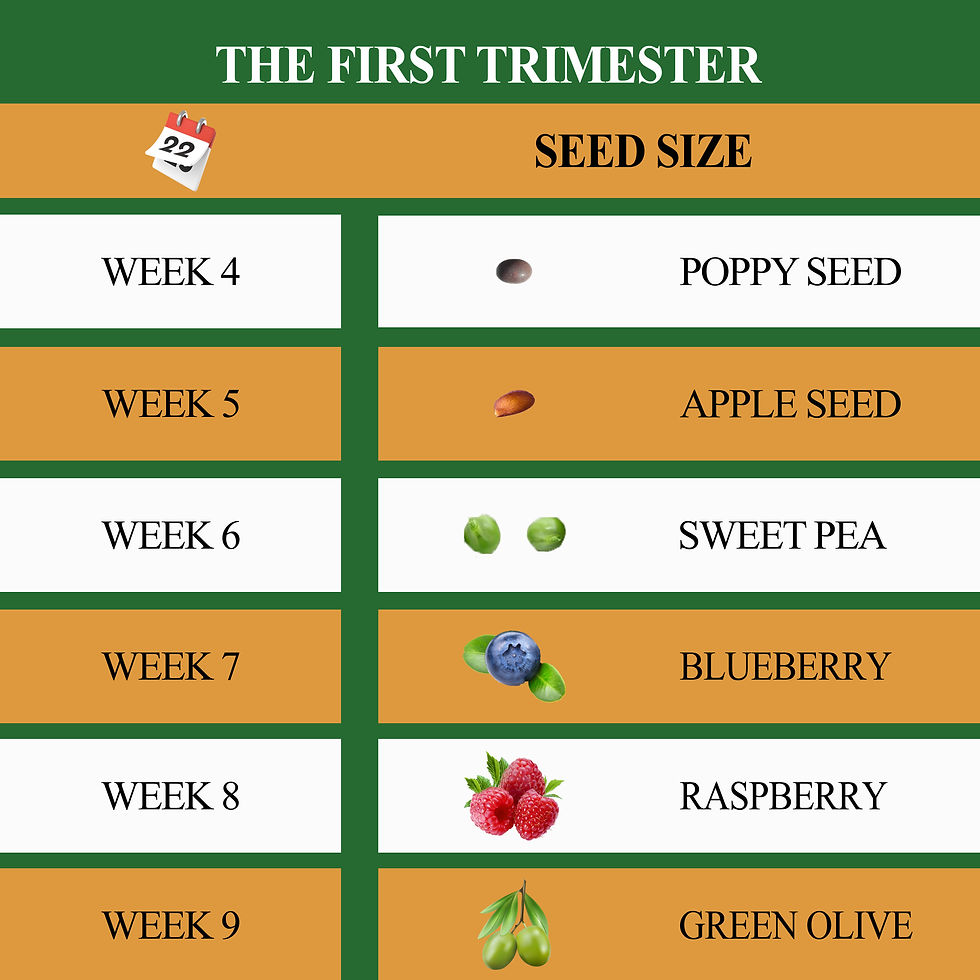DEVELOPMENT OF A BABY DURING THE FIRST TRIMESTER
- Druzycare
- Jun 2, 2024
- 3 min read
Updated: Jul 12, 2024
THE FIRST TRIMESTER
Your baby grows weekly and can be calculated starting from the first day of your last menstrual cycle, although conception begins two weeks after your last menstruation.

1st week: this week is the week you menstruate, i.e. bleeding takes place.
2nd week: the growth of the Graafian follicle to maturity until ovulation takes place.
3rd week: fertilization is what happens when the egg or ovum is fertilized by the sperm in the fallopian tube. The fertilized egg starts to grow by dividing into cells called morula, and continuous cell division is called embryonic division.

FOURTH WEEK
The embryo reaches into the uterus at week 4 and attaches to the uterine surface by releasing enzymes that dissolve the uterine lining. This allows the embryo to embed itself in the endometrial lining of the uterus, where it obtains nutrition from the bloodstream. The trophoblast, the outermost layer of the embryo, develops into the placenta together with your child. It is the size of a poppy seed and separates into three different layers where the development of tissues and organs take place. Layers include:
Ectoderm: This layer forms your baby’s neural tube, brain, spinal cord, spinal nerves and backbone (nervous system) skin, eyes and ears.
Mesoderm: this layer forms your baby’s heart, blood vessels, blood cells, lymph vessels (circulatory system), bones, muscles, kidneys, ovaries or testicles.
Endoderm: your baby’s lungs, intestine, stomach and urinary bladder are formed.
FIFTH WEEK
This is the precise week that you stop getting your period, and it's also the week that the nervous system, the heart, and the blood vessels (the circulatory system) begin to form. The size of your child is that of an apple seed.
SIXTH WEEK
Your baby has tripled in size, and the ultrasound scan is the only way to hear the heartbeat, which is now beating with a regular rhythm. The eyes, ears, mouth, and neck are still forming, but it is possible to record the hemispheres and waves of the developing brain. The infant is about as big as a sweet pea.
SEVENTH WEEK
This week, the umbilical cord, which connects your unborn child to the placenta and carries nutrients, oxygen, and waste products, is beginning to form. The legs, arms, hands, and feet are developing, while the complexity of the brain is increasing. Your infant is about as big as a blueberry.
EIGHTH WEEK
The wrists, elbows, and ankles become more apparent, the fingers and toes begin to form, and the arms and legs are longer. The major internal organs (the heart, lungs, kidneys, liver, intestines, and brain) are progressively forming together with the eyelids, ears, top lip, and tip of the nose. The infant is about as big as a raspberry.
NINTH WEEK
In the ninth week, your baby begins to resemble a person, with the head being larger than the rest of the body. The internal reproductive organs, including the ovaries and testes, are beginning to develop while the digestive system, which includes the pancreas, anus, bile ducts, gall bladder, and intestines, is developing. Your infant is about the size of an olive.

TENTH WEEK
Vital organs are formed and developing steadily towards full maturity. Its size is comparable to a prune.
ELEVENTH WEEK
In the eleventh week, the nail beds are growing along with the fingers, toes, and ears. Your baby's length, which is currently the size of a lime, is approximately half taken up by its head.
TWELFTH WEEK
The intestines are finishing up their growth in the 12th week and returning to the abdomen. White blood cells are created to fight off pathogens as the pituitary gland develops and can begin generating hormones. The infant is roughly plum-sized.

MY PREGNANCY JOURNEY is a highly recommended journal to keep records for future references. Purchase your downloadable pregnancy journal.





Comentarios